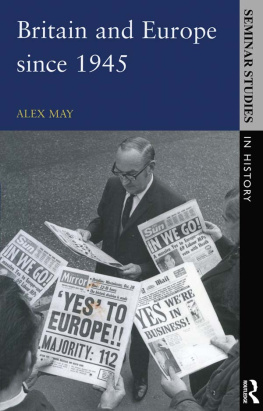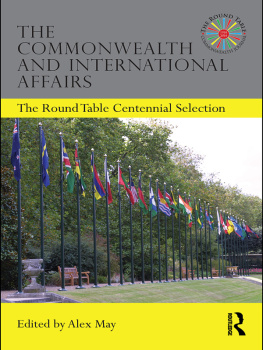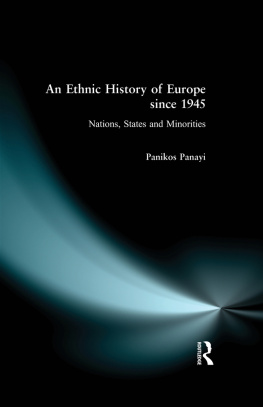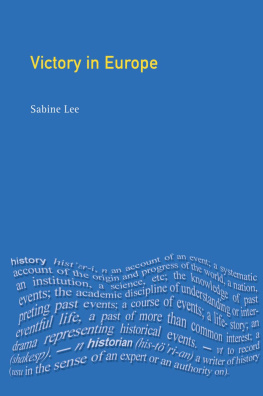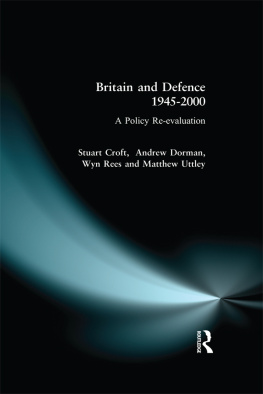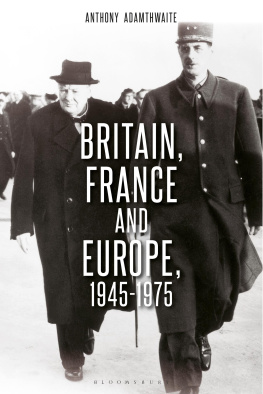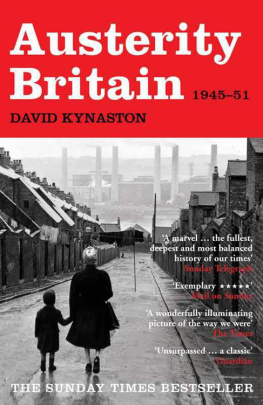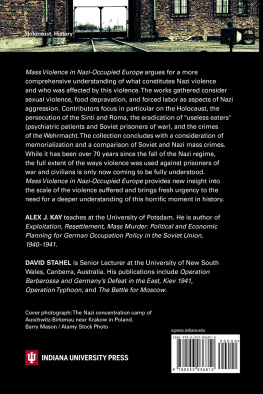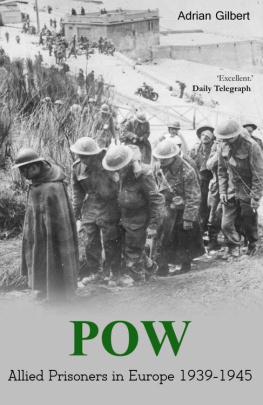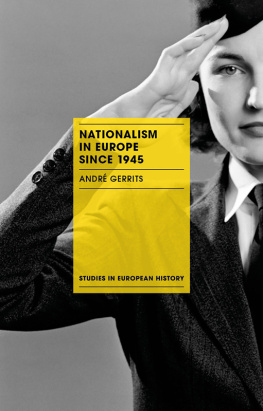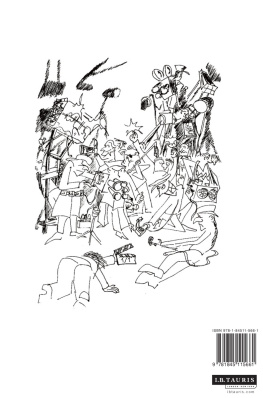Britain and Europe since 1945
Britain and Europe since 1945
ALEX MAY
First published 1999 by Pearson Education Limited
Published 2013 by Routledge
2 Park Square, Milton Park, Abingdon, Oxon OX14 4RN
711 Third Avenue, New York, NY 10017, USA
Routledge is an imprint of the Taylor & Francis Group, an informa business
Copyright 1999, Taylor & Francis.
The right of Alex May to be identified as the author
of this work has been asserted by him in accordance with
the Copyright, Designs and Patents Act 1988.
All rights reserved. No part of this book may be reprinted or reproduced or utilised in any form or by any electronic, mechanical, or other means, now known or hereafter invented, including photocopying and recording, or in any information storage or retrieval system, without permission in writing from the publishers.
Notices
Knowledge and best practice in this field are constantly changing. As new research and experience broaden our understanding, changes in research methods, professional practices, or medical treatment may become necessary.
Practitioners and researchers must always rely on their own experience and knowledge in evaluating and using any information, methods, compounds, or experiments described herein. In using such information or methods they should be mindful of their own safety and the safety of others, including parties for whom they have a professional responsibility.
To the fullest extent of the law, neither the Publisher nor the authors, contributors, or editors, assume any liability for any injury and/or damage to persons or property as a matter of products liability, negligence or otherwise, or from any use or operation of any methods, products, instructions, or ideas contained in the material herein.
ISBN: 978-0-582-30778-0 (pbk)
British Library Cataloguing-in-Publication Data
A catalogue record for this book is available from the British Library
Library of Congress Cataloging-in-Publication Data
May, Alex (Alex Charles)
Britain and Europe since 1945 / Alex May.
p. cm. (Seminar studies in history)
Includes bibliographical references (p. ) and
index.
ISBN 0-582-30778-3
1. EuropeRelationsGreat Britain. 2. Great
BritainRelationsEurope. 3. Great Britain
-Politics and government1945- I. Title
II. Series.
D1065. G7M375 1999
303.4824104dc21 |
98-28607
CIP |
Set by 7 in 10/12 Sabon
CONTENTS
Such is the pace of historical enquiry in the modern world that there is an ever-widening gap between the specialist article or monograph, incorporating the results of current research, and general surveys, which inevitably become out of date. Seminar Studies in History are designed to bridge this gap. The series was founded by Patrick Richardson in 1966 and his aim was to cover major themes in British, European and World history. Between 1980 and 1996 Roger Lockyer continued his work, before handing the editorship over to Clive Emsley and Gordon Martel. Clive Emsley is Professor of History at the Open University, while Gordon Martel is Professor of International History at the University of Northern British Columbia, Canada and Senior Research Fellow at De Montfort University.
All the books are written by experts in their field who are not only familiar with the latest research but have often contributed to it. They are frequently revised, in order to take account of new information and interpretations. They provide a selection of documents to illustrate major themes and provoke discussion, and also a guide to further reading. The aim of Seminar Studies is to clarify complex issues without over-simplifying them, and to stimulate readers into deepening their knowledge and understanding of major themes and topics.
Readers should note that numbers in square brackets [5] refer them to the corresponding entry in the Bibliography at the end of the book (specific page numbers are given in italics). A number in square brackets preceded by Doc. [Doc. 5] refers readers to the corresponding item in the Documents section which follows the main text.
The publishers would like to thank the following for permission to reproduce copyright material: Macmillan Ltd for two tables from British Political Facts, 190094 by David and Gareth Butler, 1994; Sir Colin Marshall for a letter from the Financial Times, 11 March 1997; Sir Teddy Taylor for a letter from The Times, 11 February 1997; Financial Times Professional Ltd for extracts from From the Six to the Twelve: The Enlargement of the European Communities, by Frances Nicholson and Roger East, published by Longman Group UK Limited in 1987; The Economist, London for an extract from 10 July 1950; Her Majesty's Stationery Office for Documents on British Policy Overseas Series I Vol V, Series II Vol I, Series II Vol III; Various PRO documents PRO FCAB 128/48 c(51)32), PRO CAB 128/29 cm(55)19), PRO T234/203), PRO CAB 134/1820, EQ (60)27); Cmnd 1565 and Cmnd 4715; Britain's New Deal in Europe, published in May 1975; Crown Copyright is reproduced with the permission of the Controller of Her Majesty's Stationery Office.
Whilst every effort has been made to trace the owners of copyright material, in a few cases this has proved to be problematic and we take this opportunity to offer our apologies to any copyright holders whose rights we may have unwittingly infringed.
I am here in a country which hardly resembles the rest of Europe, the French philosopher Montesquieu declared during a visit to Britain in 1729. A number of historians have confirmed the substance of his observation. Indeed, Alan Macfarlane has argued that as early as the fifteenth century the decline of serfdom, the rise of a market economy and the existence of a distinctive legal system had produced in England (although not necessarily in Wales, Scotland or Ireland) a society in which almost every aspect of the culture was diametrically opposed to that of the surrounding nations [56 p. 165]. While such arguments should not be pressed too far, most historians would agree that the developments of the sixteenth to nineteenth centuries reinforced rather than diminished whatever elements of separateness and distinctness existed. The religious Reformation, although paralleled by developments on the continent, was unique both in its origins and its consequences, and provided the English and lowland Scots with a peculiar sense of providential destiny. The political changes of the mid-seventeenth to early eighteenth centuries the Civil War of 164260, the Glorious Revolution of 1688 and the Act of Union of 1707 reinforced this sense of uniqueness. The integration of Britain itself was accompanied by a new and assertive role as a maritime power and by the steady accumulation of a vast overseas empire. War, religion, empire, prosperity and parliamentary freedom combined to forge a widespread and active British patriotism, which defined itself largely by opposition to the culture of continental Europe. The industrial revolution, which transformed the British economy earlier and more thoroughly than any of its continental neighbours, gave added impetus to the public myth of uniqueness which had already taken hold [47 p. 149, 52].
The nineteenth century was Britain's heyday, the period of its greatest relative economic and political power. The British Empire encompassed a quarter of the earth's land surface and a similar proportion of its inhabitants. It was perhaps inevitable that the British should see themselves not only as unique amongst Europeans, but also as separate and different; and that British policy towards the continent should be characterised (in Lord Salisbury's famous words) by splendid isolation. Yet even at this high point many recognised that Britain was still a part of Europe; that British culture and British power were reflections of more general European trends. Towards the end of the century, the differences between Britain and its continental neighbours palpably diminished. Other countries industrialised some more proficiently than Britain. The Scandinavian countries, Belgium, the Netherlands and France (after 1870) maintained political systems at least as liberal and democratic as Britain's. Moreover, centuries of history confirmed that Britain could hardly remain indifferent to developments across the Channel. By the close of the century the dangers of isolation were becoming apparent. Europe was increasingly dominated by a powerful and expansionist Germany, which now embarked on an ambitious naval programme. Colonial conflict was becoming ever more likely. The South African war of 18991902 administered a sharp shock to the British psyche: the whole of Europe was hostile, while all available British forces were tied up by a handful of Dutch settlers. As the new century dawned, British politicians scrambled to shore up the balance of power, and with it Britain's position. Alliances were concluded with Japan in 1902, with France in 1904, and with Russia in 1907. By these alliances, however, Britain merely increased the tensions in Europe, which was now firmly divided into two armed camps. When war finally came in 1914, it was almost a relief [15,


